Self Study for the GMAT Resource Recommendations
TLDR: The GMAT™ Official Guide 2024-2025: eBook & Online Question Bank and the GMAT™ Official Practice Exams were the best ways I found to self-study. Also, I brag about doing well on the GMAT.
I've studied for the GMAT twice.
The first time was in 2004. I was unemployed and wanted to go back to graduate school to get an MBA. I signed up for a Kaplan study course and diligently attended the classes, taking paper facsimiles of the test, from about May to August, taking the test in late August. I was also applying to jobs, but probably spend at least 2-4 hours every day studying for the GMAT.
I did really well (see table below). My scores in 2004 were something which I would turn to in my mind and look back upon fondly, thinking "see, I actually am smart, I have test scores to prove it" whenever I felt dumb. This type of behavior is problematic on many levels (the GMAT is not an intelligence test, and even if it was, it's not healthy to look to external validation to try to make yourself feel smart, and if I did need external validation, it would be great if I looked to feeding homeless people or something to get it instead of standardized test results, etc.) but meh, what can you do, you work with what you have.
| Verbal | Quantitative | AWA | Total | |
| Scaled Score | 45 | 50 | 6.0 | 770 |
| Percentile | 99% | 95% | 97% | 99% |
Anyway, fast forward to now. I am applying to Phd in Business programs and they require a GMAT score that is less that five years old. From my studying for the GMAT, I know that 20 years > 5 years, so, I had to take the GMAT again.
Things have changed in the last twenty years. The first change is in the test itself. The organization that puts out the GMAT (the Graduate Management Admission Council or GMAC) has a new version of the GMAT called the GMAT Focus Edition. Among other changes, the Analytical Writing Assessment (AWA) which was on the test in 2004 has been replaced with the Data Insights section, which is sort of like a reading comprehension test where the readings used have a lot of tables and graphs. The Focus Edition also "recalibrated" the scores for each section, such that a score on the quantitative section in 2004 is not directly comparable to a score on the quantitative section in 2024.
If you do want to compare scores, the advice from the GMAC folks is to look at the percentiles for each score and use that to translate from one to the other. This advice is problematic though because of the second change in the GMAT; many more people are getting high scores on the quantitative section of the GMAT than got high scores on the quantitative section 20 years ago (more on this later).
Just as the GMAT has changed, this time around I'd have much less time to study for the GMAT. Instead of 4 months between when I decided to take the GMAT and when I took it, this time I only made the decision to apply to graduate school in early October, with applications deadlines as early as December 1st. I ended up taking it on November 20th, which is only about six weeks of calendar time to study.
Finally, and perhaps most troublesome, I've changed a lot in those 20 years. Instead of a 25 year old unemployed person with lots of time and something to prove, I am now a 45 year old employed father of two. I don't have as much time to study every day as I did back then. My joints hurt and creak at night. I get confused easily. I walk slower. I'm old.
When I started self-testing, the situation looked pretty grim (see the chart below).
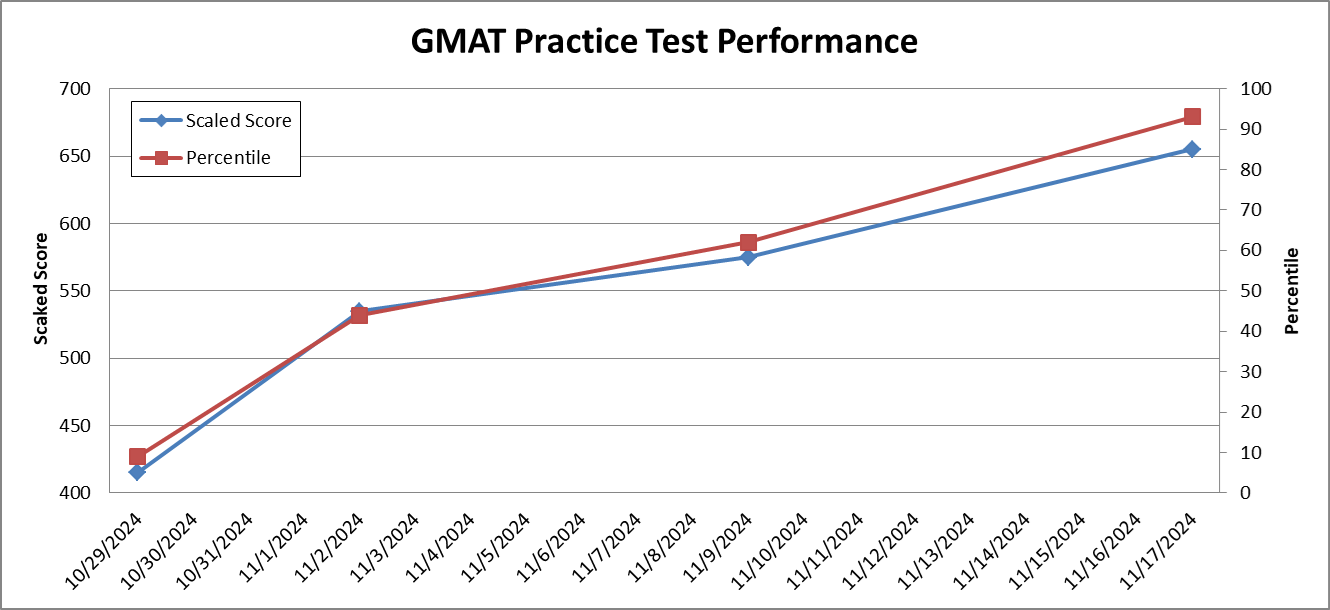
On the first test, I got an overall score of 415 which is in the 9th percentile, meaning 91% of test takers in the last 5 years did better on the test than I did. This is not great. Thankfully, the result was largely due to poor time management on my part, which I improved over time. By the last practice test, I got a 655 which is the 93rd percentile, meaning 7% of test takers in the last 5 years did better on the test than I did.
The last practice was basically how well I did on the actual test (see table below).
| Verbal | Quantitative | Data Insights | Total | |
| Scaled Score | 88 | 78 | 82 | 655 |
Percentile | 99% | 50% | 93% | 91% |
I hope the overall score is good enough to meet the minimum requirement for at least some of the PhD programs to which I am applying. But the quantitative score worries me. Phd Programs are not explicit about how they use applicant's GMAT scores. Most sources indicate that graduate schools use the GMAT as a filter to make sure that applicants can complete the coursework in their MBA program. According to an article I found on a GMAT tutoring business called Atlantic Tutoring, the percentile of the quant section is not as important as the scaled score; getting a scaled score of 45 is what is important.
That's comforting, except that the Atlantic tutoring article was using the pre-Focus GMAT scoring, so how do we translate my scaled quant score of 78 on the GMAT Focus into it's equivalent scaled score on the pre-Focus GMAT?
Thankfully, there is a chart from GMAC that shows how to do just that, using the percentile ranking as the key to match the pre-Focus and Focus scores. According to this chart, a GMAT Focus quant scaled sore of 78 translates to a pre-GMAT quant scaled score of 45, right on the line. So, there is still hope.
I'm sure the question on nobodies mind reading this is how does my 2004 quant score compare to my 2024 score? Pre-Focus GMAT scores are intended to be comparative, so while we can't compare the Focus score directly to my pre-Focus score, we can compare the pre-Focus equivalent of my Focus score to the earlier score. That is, we can directly compare the pre-Focus 50 score from 2004 to the pre-Focus 45 score translation of my 78 Focus score from 2024. So, I did better in 2004. How much better?
Here is where things get interesting. According to that same Atlantic Tutoring article, the percentiles associated with each score have shifted a lot over the last 20 years, largely due to a greater percentage of the overall population of GMAT test takers scoring better on the quant portion. A quant score of 50 on the pre-Focus GMAT in 2004 was in the 95% percentile. Now a score of 50 would have been in the 89% to 97% range. The "range" for the pre-Focus GMAT quant score on the concordance chart is interesting; it implies to me that in addition to making the GMAT more relevant, GMAC also wanted to get a better spread in scores, perhaps to be able to better distinguish between test takers who were all falling into one very high score on the pre-Focus test results.
A 45 in 2004 would have represented a 75% score, but is now a 50% score. So, I did worse, but hopefully still good enough.
As a bit of a digression, as someone who has already been through business school to get their MBA and then worked in industry for 20 years, I'm not sure that the quantitative portion of the GMAT is really a great way to measure your ability to competently perform the types of math you do during an MBA program or when making effective business decisions. On the quant portion for the GMAT, even for complex arithmetic operations you cannot use a calculator or a spreadsheet. Nowadays, outside of calculating the tip on a bill, I use a spreadsheet to perform all arithmetic for me. Before studying for the GMAT again, I think the last time I performed long division was the last time I studied for the GMAT 20 years ago. And during graduate school (the first time at least), the most complex calculations we ever did were multivariable linear regression, which is emphatically not anything like algebra.
In my career, I've rarely used the kind of math skills tested for on the GMAT. Granted, for most of my career I've been a product manager, which means my math skills usually only come up when I'm pulling together a business case. But even if I was a quantitative analyst, I have a hard time imagining anyone doing any math without the aid of a computer. Indeed, when I hear someone rattle off a math calculation that they have performed quickly in there head, I take it as a sign of insecurity on their part and that they are trying to show how smart they are. The kind of Fermi problems that are classic interview fodder I find distasteful, as any real effective business decision I think should be made on the basis real effective research.
That isn't to say that estimation doesn't have it's place in making business decisions. Often times, you must extrapolate to things like sales projects or project schedules based off the best data you have available. But some of the market size estimates that are shown as examples are laughable. The person is either estimating something which can't possibly be proven or disproven until long after they have cashed their check or the complexity of the calculations seem more aimed at providing a false sense of precision than they are at practically improving the estimate in any meaningful way.
A far more accurate proxy for the math in graduate school would be to provide test takers with CSV files for certain questions and ask them to use Excel to find the answers. The type of test that most closely matches what I have in mind is a project I did for Crossover for Work as part of a product management job application once (not the Crossover for Work Cognitive Aptitude Test). While I'm not a huge fan of Crossover for Work or Trilogy, I thought that take home project was a reasonable set of tasks that were actually pretty close to the kinds of things you are expected to do as a product manager. They gave me a data set and asked a bunch of question about it, very similar to the Data Insights portion of the GMAT, but with access to real tools like spreadsheets to work on the data set to obtain your answers. Instead of pushing high-school math to the limit, people taking the GMAT would have to possibly learn new skills, like how to use Excel effectively, but the effort to do that would probably not be much more than the math refresher someone who takes the GMAT has to do anyway. And improving your Excel skills are actually useful even outside of the GMAT, much more useful than remembering how to handle negative fractional exponents.
The time constraint on the GMAT means the attitude I must have to take it successfully is very different than than the attitude which I normally bring to work. On the GMAT you only have about 2 minutes on average per question. In my work, there has never been a circumstance where I needed to solve a math problem in 2 minutes. There has particularly never been a problem which I had to solve without using Excel. As a proxy for the time pressure of trying to learn and complete a problem set in a few hours before you have homework the next day, I think the GMAT quant portion is probably a good proxy for how one approaches business school. In both circumstances, saying "I don't know" or not trying to answer a question is just as bad as getting the question wrong.
In contrast, in my career, knowing what you are talking about and limiting yourself to that has been more important than guessing if you don't know. In fact, if you don't know what you are talking about and just guess, often it can be much worse than if you admit you don't know the answer and wait to make a decision until you find someone who does know what they are talking about or take the time to make sure the answer is correct.
One explanation from Kaplan I've seen for why the GMAT is so time constrained is that "[t]he GMAT is really a test of your executive reasoning skills: Your ability to evaluate a 'business opportunity', recognize which ones are good opportunities (and which aren’t), prioritize accordingly—and stick to your decisions. In other words, the GMAT is testing you on your ability to make effective business decisions. And time management is naturally a key skill in making effective business decisions." The metaphor is stretched further when Kaplan promises to "... take you through how to train yourself to switch from an “old school” mindset (try to get every problem right) to a “b-school” mindset (make the best decision based on current information, including walking away from low-quality investment opportunities)." While I agree in the real world one often really does have to make the best decision you can based on current information, including walk-away from low-quality investment opportunities, I do think the GMAT is not really testing that simulating that with allowing about 2 minutes per question. I can't think of a time in my career when I've said to myself "figuring out this investment opportunity will take too long, let me just guess whether I should invest in it or not and move onto the next investment opportunity." (I mean, maybe bit coin falls into that bucket?) That attitude doesn't align with the way that the GMAT is scored. If you wanted test takers to take into consideration the time or complexity of the answer, allowing for partial credit for answers that were close to the correct answer would make sense. That would be in keeping with making the best decisions possible with the current information available; sometimes there is a trade off between getting answer that is close to right and trying to get it exactly right, and the extra effort isn't worth the additional precision, as the precision is based on estimates that are not that accurate anyway.
Now on to the promised Recommendations I alluded to in the title.
In studying for the GMAT, I choose to self-study instead of take a class because 1) I had found that the GMAT class, while a good way to spend my time while un-employed, spent a lot of time covering things I already knew, and not enough time focusing on the areas I would need to improve, so wasn't a very good use of time and 2) I don't have the time to take a class, my life is too busy due to the aforementioned job and children and wife and dog (and makerspace side business, but that is a whole other blog post).
I started using the Magoosh quant flash cards. I worked my way through them using a dry erase board until I could answer the flash cards consistently. In retrospect the Magoosh quant flash cards were not a great use of time because Magoosh has not updated them to remove the geometry questions, which are not relevant for the new GMAT Focus, and the flash card format is inherently limiting when learning the quant material. Flash cards are intended for memorization, not learning new skills. As such, the focus is not on a wide variety of "questions", but on a narrower set of questions which you are repeatedly exposed to. Repeated exposure to quant questions lead to one knowing the answer from the last time you saw the answer, which defeats the purpose of trying to learn how to calculate the answer to the question, the skill you actually need to do well on the GMAT.
Next I tried Kaplan self-study testing materials. Back in 2004 I was very impressed with Kaplan, so impressed that after I took the GMAT I applied for a job teaching Kaplan classes others how to study for the GMAT. I was accepted and started the training for the role until in November I received word that I had go into the Columbia Business School MBA program that started in January. At that point I stopped my Kaplan teacher training. I never ended up teaching for Kaplan, but I had found memories of Kaplan and found their study tools really helpful back in 2004 so I figured they still be great in 2024.
Boy, was I wrong. In the interim, the Kaplan GMAT curriculum had merged with Manhattan Prep. The Manhattan Prep Self Study Toolkit costs $359. That includes six full-length GMAT practice tests, which are actually validation codes to get access to six of the full-length GMAT practice tests offered by the GMAC, two of which you can get for free from the GMAC anyway as part of their free GMAT Official Starter Kit. In addition, buying the tests directly from the GMAC allows you to buy them as you need them in instead of four all at once. If you do buy them all at once, the combined price for the four extra exams on GMAC is $108. In addition, the Manhattan bundle includes a code to gain access to the GMAC GMAT™ Official Guide 2024-2025: eBook & Online Question Bank, a $50 value. Excluding the practice tests and GMAC question bank, that means that the Manhattan prep materials are really like $200 of additional content, delivered primarily through two Manhattan Prep ebooks, the Manhattan Prep GMAT Navigator tool, and suggested weekly reading and problem-set assignments.
In retrospect, it looks like the additional content I paid $200 could have been obtained by buying the paperback books on Amazon for $103, which are bundled with access to the GMAT Navigator tool and the weekly reading and problem-set assignments but excludes the GMAC content.
The GMAT Navigator is a horrible tool. It is delivered on a platform which Manhattan Prep calls "Atlas". Below please find a screenshot of the GMAT Navigator interface.
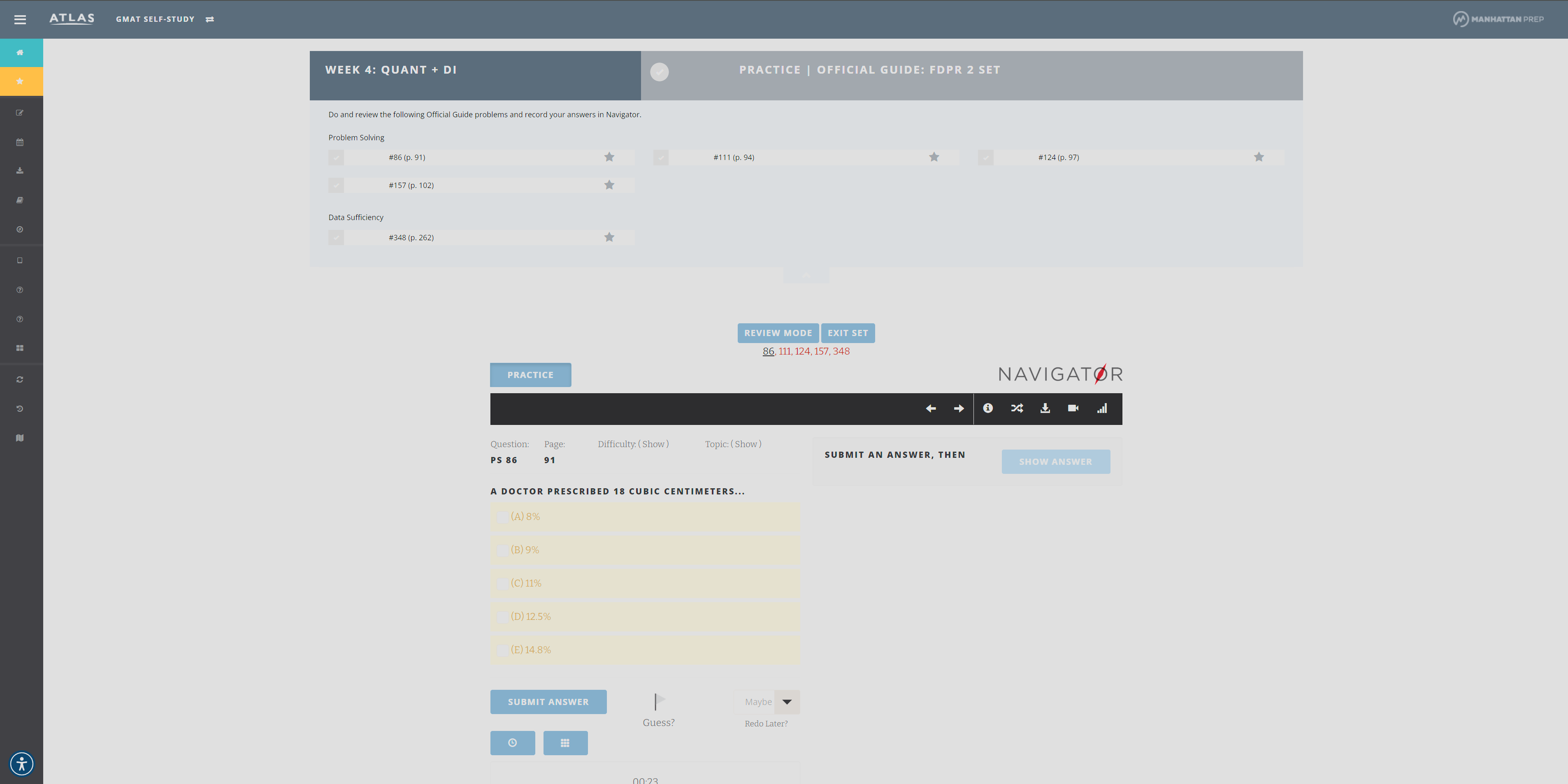
Let's take this user interface piece by piece, shall we?
In the upper portion, we see the questions we are looking to solve.
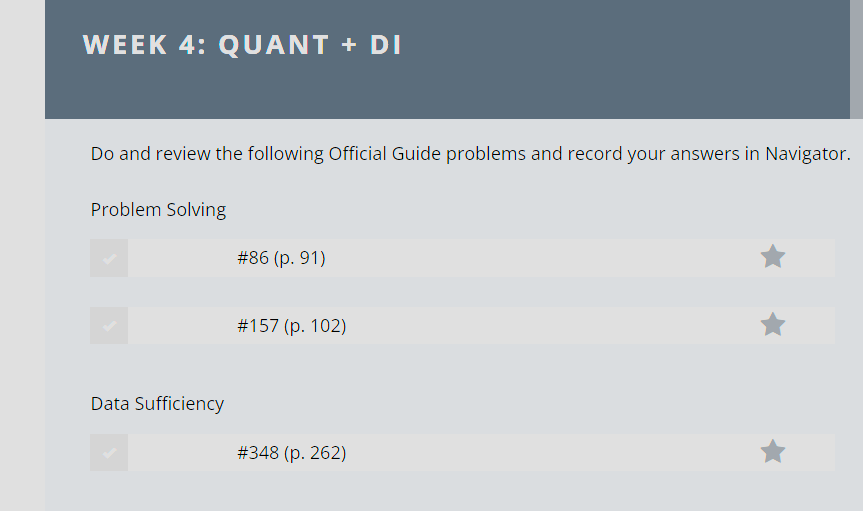
Keen eyed observers will note that problem numbers and page numbers are being referred to. The text of the problem is not in interface; in order to see the text of the problem you are trying to solve, you have to go to the separate GMAC Official Guide 2024-2025 ebook (again, another resource that Manhattan Prep is just reselling from the GMAC where you can buy it bundled with their online question bank), and look the question you are actually trying to answer up in that book, which is delivered on a separate platform called VitalSource.
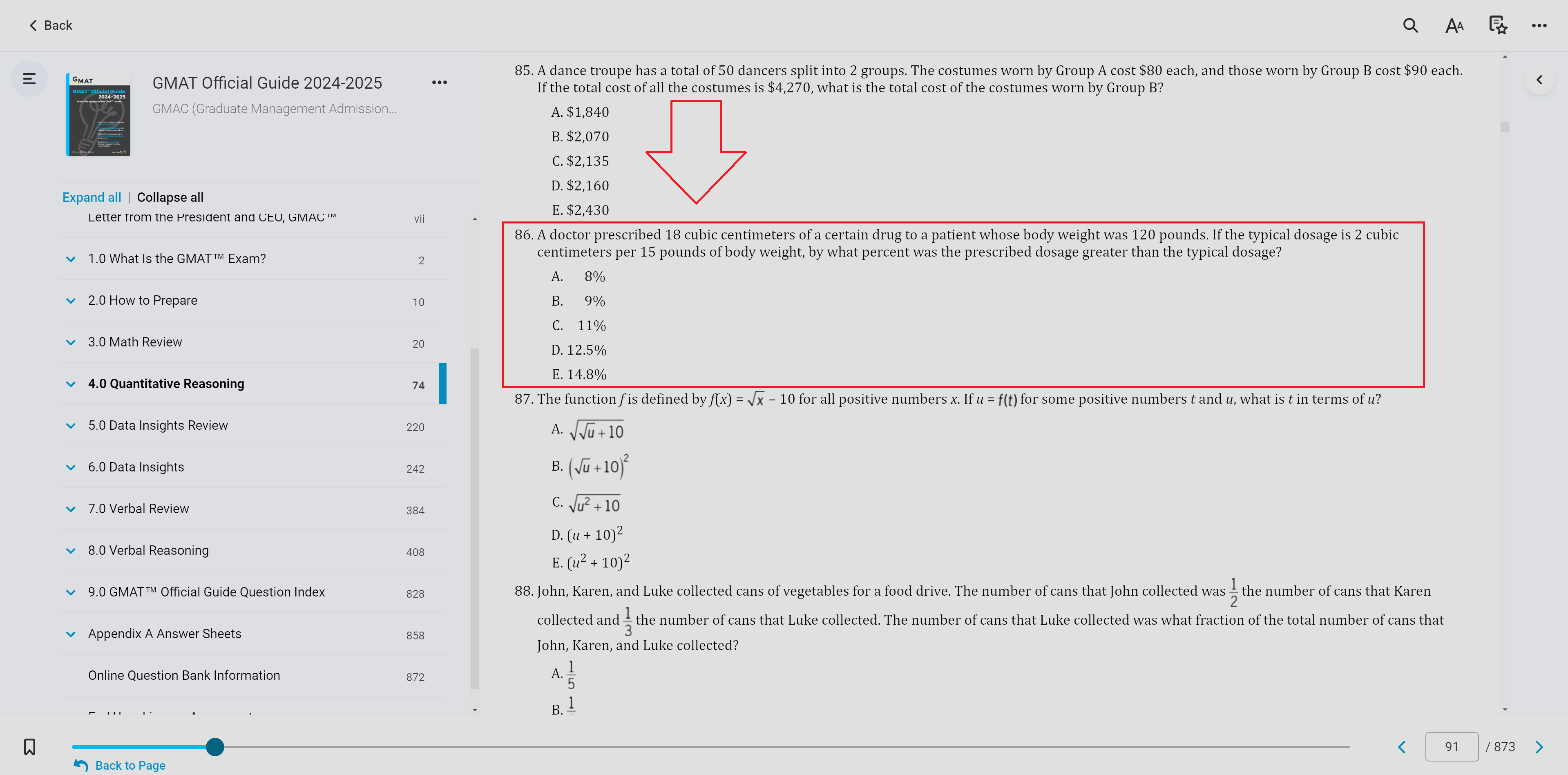
The reason why the questions are delivered in an ebook and the answers are delivered in the GMAT Navigator is addressed in Manhattan Prep's own instructions; Manhattan prep is providing answers to questions they didn't author, so they can't use the question text without violating copyright. Let's pause for a moment to reflect on how messed up this is. Because Manhattan Prep is not providing the questions themselves in Navigator, you have to instead look up the question text in a separate platform. Not only that, the user is expected to keep track themselves of whether they got the answer correct or not in the upper portion of the screen, even though in the lower portion of the screen they are using the actual navigator to answer the questions and get feedback on whether they answered the question correctly or not.
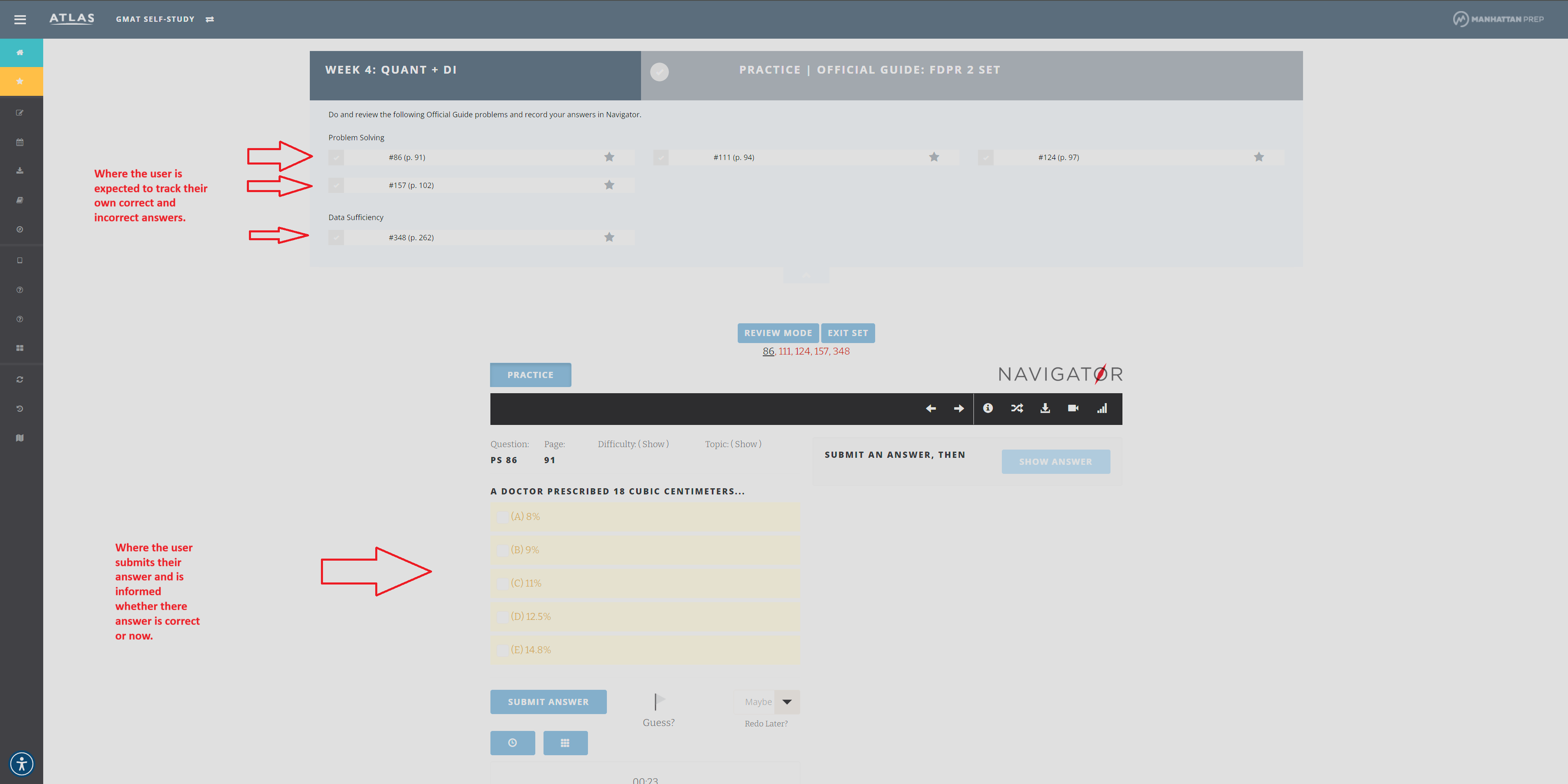
Manhattan Prep will tell you that there answers are worth it though, because their explanations are so much better than GMAC's explanations. From their GMAT Navigator setup instructions: "Welcome to GMAT™ Navigator! Your Official Guide (OG) [from GMAC] is the best source of practice problems, but the official solutions...well, let's just say that the test makers are not in the business of teaching you how to get better at their test. So we've written our own solutions to help you learn the fastest and easiest ways to get to the right answer while avoiding traps."
I have not found this to be the case. The explanations of the question answers in GMAC products seem to be just as good as the explanations of question answers in Manhattan prep products.
Instead of using Manhattan Prep or Magoosh, I recommend starting with the GMAC GMAT Official Starter Kit which is free, and take those practice tests. If you do well enough on the practices tests and you feel confident that you will perform well on the GMAT, you don't need to study anymore and you're done.
However, if like me you want to improve your score from what you received on your practice tests, I recommend purchasing the GMAT™ Official Guide 2024-2025: eBook & Online Question Bank (your year will of course vary, as you are in the future, so buy the edition that matches the year you are in).
I went through the recommended syllabus for the Official Guide and Online Question Bank (OGOB), following the Study Plan the OGOB recommends, until I got to about the sixth "Quantitative Online Question Bank" step. At that point, I started building custom question sets using the Practice Questions feature in the left hand navigation, focusing on the areas where I had done least well on in the earlier diagnostic tests. Unlike the Manhattan Prep GMAT Navigator, the OGOB displays both the questions and the answers on the same page and keeps track of which questions you get correct and incorrect without you separately having to keep track of that tally.
To be far to the Manhattan Prep materials, Manhattan Prep also provides a question bank which is roughly equivalent to the to the online question bank, with similar diagnostic tools. But, only some of the Manhattan Prep questions in their question bank are actual test questions from actual GMAT exams. Given that the Manhattan Prep study materials guide you to using the Official Guide questions, it seems that both Manhattan Prep and the GMAC agree that the GMAC study questions are the best ones to use. So, why not use those in the GMAC online question bank instead of in the Manhattan Prep question bank and focus on questions which are all official GMAC questions?
